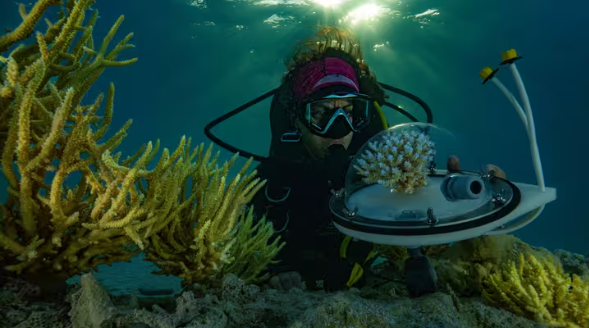In the Tatakoto Atoll, French Polynesia, scientists from the CNRS have discovered healthy corals that have withstood episodes of heat.
These resilient corals could play a key role in restoring coral reefs threatened by climate change.
In the Tatakoto Atoll, in French Polynesia, scientists from the CNRS have discovered healthy corals, despite episodes of heat. They could help restore coral reefs threatened by climate change.
Its lagoon, connected to the ocean only by small channels, undergoes extreme temperature variations: an increase of 3 to 4°C per day, with water temperatures reaching up to 35°C.
And yet, scientific expeditions supported by UNESCO have discovered dozens of coral species in perfect health, thriving in this particularly hostile environment. Among them are Acropora, which resemble deer antlers. Normally, they’re the first to die during heatwaves, but these have survived the most recent episode of marine heat.
Genetic Quirk?
Researchers from the CNRS, who are leading the studies, are investigating the source of this resistance. Two hypotheses are on the table: either a temporary acclimatization to the harsh conditions, or a genetic adaptation—meaning these corals could be passing on their heat resistance from one generation to the next.
To find out, scientists took coral cuttings from the atoll and replanted them in Moorea. If they survive, it will be the first solid evidence that these exceptional corals can be used to repopulate more fragile reefs. The Tatakoto Atoll could even serve as a kind of « reservoir, » supplying transplants to reefs devastated by climate change.
A Vital Boost in a Losing Battle
Such a breakthrough would offer a much-needed boost in the increasingly dire fight to save the world’s corals. They are being hit by increasingly massive and frequent bleaching events—when the ocean becomes too warm, causing the micro-organisms that make up corals to die.
According to the UN, 90% of coral reefs are at risk of disappearing by 2050. This would be a catastrophe for biodiversity, as reefs shelter about a quarter of all marine life. But it would also be a serious threat to humans: coral reefs protect coastlines from erosion and storms, and host species that help feed half a billion people worldwide.
Source: francetvinfo


